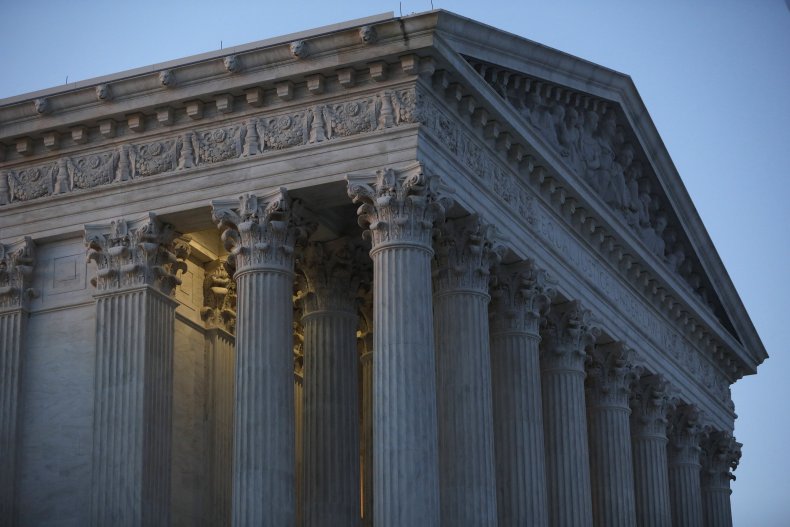New Voting Rights Laws Could be Upheld by the Supreme Court | Opinion
Voting rights bills are advancing in Congress.
They're the best hopes for thwarting Republican attempts to disenfranchise minority voters—voters largely responsible for Joe Biden winning and Republicans losing the Senate. Both would bind the states, as opposed to depending on court battles in each state, to protect the voting rights of minorities. But can they be enacted? And if they can, would the Supreme Court strike them down like it struck down the core of the 1965 Voting Rights Act (VRA)?
H.R. 1 and H.R 4 passed the House, and H.R.1 was introduced in the Senate as S 1, with hearings and a floor debate scheduled this week. It would impose requirements on state voting procedures, including independent bipartisan commissions to draw congressional districts.
H.R. 4 would replace the formula in the VRA's Section 4. The formula identifies states and political subdivisions required to obtain federal approval before making changes to voting laws that could disadvantage minorities. Specifically, H.R. 4 would require federal pre-clearance for any of the following actions:
—Gerrymandering that makes quantified changes in minority districts;
— Changes in documentation required to vote, such as proof of identity, that exceed existing requirements;
— Changes that make mail-in voter registration more difficult than proposed federal requirements;
—Changes that reduce, consolidate, or relocate voting locations.
S. 1 may face a filibuster, but Senate Majority Leader Chuck Schumer warned that "everything is on the table" to avoid one, including the "nuclear option." It would allow the majority leader, by a point of order, to end debate on bills such as S. 1 by a simple majority instead of a two-thirds vote. That interpretation of the filibuster rule would not itself be subject to debate, so it couldn't be filibustered.
Another approach is President Joe Biden's proposal to reinstate the requirement that senators be physically on the floor when arguing against proposed legislation. Currently, they can trigger a filibuster remotely by simply registering their objections to a bill. But if they're required to occupy the floor, once an opponent stops speaking, the bill could pass by a simple majority.

Either way, it's possible for these pending voting bills to clear the Senate with 51 votes rather than 60. But if they become law, they'll confront a skeptical Supreme Court led by a chief justice with a record of swinging decisions in favor of restrictive voting laws.
In 2013, the Supreme Court ruled 5-4 that the formula in VRA Section 4, used to identify states and political subdivisions requiring federal pre-clearance to make changes to their voting procedures, was unconstitutional.
The Court held the formula was based on indicia of discrimination (such as literacy tests, education requirements and low minority voter registration) that existed in 1966 when it ruled the formula to be constitutional. However, the Court decided in 2013 that racial discrimination in voting no longer justified the VRA's conflict with the 10th Amendment, which reserves to the states "the power to regulate elections," and with the principle of equal sovereignty, which bars the federal government singling out states for differential treatment.
Justice John Roberts was the swing vote in that decision, and also joined several other opinions upholding state-imposed restrictions on voting. For example, the Court upheld 5-4 Ohio's purging of ballots of voters who didn't return prepaid cards even though this may have disadvantaged minorities. Also by a 5-4 majority, it blocked a lower court decision in Alabama allowing curbside voting and loosening restrictions on absentee ballots. It stayed a lower Arizona court ruling striking down the criminalization of third-party ballot collection as discriminatory against minorities. It rejected Texas Democrats' bid to allow mail-in ballots for all voters during the coronavirus pandemic. In another 5-4 decision, it upheld Wisconsin's voiding of 2020 ballots received after a deadline extended by a federal court, arguing—incredibly—that the pandemic wasn't an "exceptional condition."
But in striking Section 4 of the VRA, Roberts also noted that violating the equal sovereignty principle might be justified if a statute's disparate treatment of states was sufficiently related to the problem it targets. He added, "legislative measures not otherwise appropriate" could be justified by "exceptional conditions."
That opens a potential argument for proponents of the current voting rights bills. But to pass muster with the Roberts Court, they will need to show that state practices for which H. R. 4 would require federal pre-clearance suppress minority voting, that Republican-controlled states have a history of suppressing minority voting and that they suppress it not because of massive voter fraud, which is a fiction propagated by Republican lies, but because minorities traditionally vote for Democrats.
If enacted, H.R. 1/S 1's requirement that independent commissions draw state voting districts would face the Supreme Court's hostility to interference with state election procedures. The Court held in 2019 that "partisan gerrymandering claims ... are beyond the reach of the federal courts."
Would the same Court hold that partisan gerrymandering is also beyond the reach of Congress? Unlikely. The Court precluded the judiciary—not Congress—from ruling on gerrymandering. It has also recognized Congress' right to regulate state election practices under "exceptional conditions." Republican redistricting deliberately based on race, as revealed in leaked Republican memos, would seem to constitute "exceptional conditions."
Voter suppression laws exploded since the Supreme Court gutted the VRA in 2013. But so has America's awareness of racial discrimination on many fronts, from police protection to pandemic relief to housing. There's also much wider reporting of the Republican strategy to restrict minority voting rather than winning over minority voters with policies. That's reason to hope that if pending voting rights laws are enacted, the Supreme Court will uphold them.
Neil Baron is an attorney who has represented many institutions involved in the international markets and advised various parts of the federal government on economic issues.
The views expressed in this article are the writer's own.


